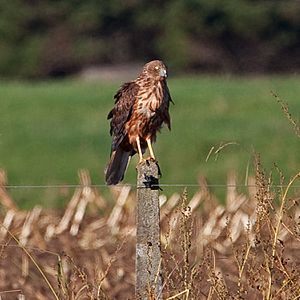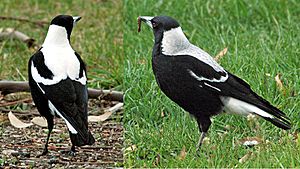Australian magpies in New Zealand facts for kids
The Australian magpie is a medium-sized bird with black and white feathers. It comes from Australia and southern New Guinea. Some magpies were brought to New Zealand to help control pests on farms.
During their breeding season, male magpies can be very protective. They might swoop at anything they think is a danger to their young chicks. Chicks are helpless for their first 2-3 weeks. You can often avoid this by letting them know you are not a threat. Sometimes, people even become friends with them through regular, gentle interactions.
Magpies are very smart birds. They can remember faces and even communicate with each other. They can share information across generations. So, if they remember a bad experience with someone, they might see that person as a threat to their babies. This helps them survive as a species. People sometimes think this behavior is aggressive, but it's just a natural way for them to protect their young.
Contents
Magpies Arrive in New Zealand
Why Magpies Came to New Zealand
Birds from Tasmania and Victoria in Australia were brought to New Zealand in the 1860s. Groups called Acclimatisation Societies helped bring them over. For example, the Wellington society released 260 birds in 1874.
Magpies were introduced to New Zealand to control farm pests. Because of this, they were a protected species until 1951. Today, it is against the law to breed, sell, or move these birds within New Zealand.
Where Magpies Live in New Zealand
White-backed magpies are found on the North Island and the eastern South Island. Black-backed magpies live in the Hawke's Bay area.
Are Magpies a Pest?
What Studies Say About Magpies
Some people believe Australian Magpies harm native New Zealand birds. They are sometimes accused of eating eggs or chicks from nests. However, scientific studies have found little proof that magpies are serious predators of native species in New Zealand.
Many stories about magpies being pests are based on what people think they see. These stories are often not based on facts. Scientists from Waikato University have studied this for many years. They have found that magpies are not a big threat to native birds.
Magpies and Other Birds
Studies suggest that native birds might avoid areas where magpies are nesting. This is because breeding adult magpies sometimes attack other birds. But actual attacks are not very common.
Interestingly, some studies even suggest that magpies can help native bird populations. They successfully chase away proven predators like Swamp harriers.

Controlling Magpies in Regions
How Pest Control Works in New Zealand
In New Zealand, managing pests is usually done by different regions. Each region creates its own plan for pest control. The Biosecurity Act 1993 gives local councils the power to carry out this control.
Nine regional councils helped fund a study by Landcare Research and Waikato University. This study found that magpies had only a small effect on other birds. It also found no proof that they are serious pests. This means that if magpies are controlled, it's usually for other reasons, like conflicts with people.
Magpie Control in Different Areas
- Nelson: The Nelson City Council sees magpies as a "Containment Pest." This means they encourage people to control magpies. They even provide traps. It's illegal to sell, breed, or release magpies in this area.
- Wellington: In the Wellington Region, magpies are a "Site-led pest animal." They are controlled for human health and environmental reasons using different methods.
- Southland: The Southland Regional Council also includes magpies in their pest management plan.
 | Selma Burke |
 | Pauline Powell Burns |
 | Frederick J. Brown |
 | Robert Blackburn |


